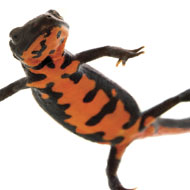
Scientists discover a major threat to amphibians in Europe
The trade in exotic pets is now believed to be responsible for the introduction of a deadly fungal disease in Europe. Scientists warn the disease poses a major threat to salamanders and newts across Europe.
Last year scientists discovered the skin-eating fungus Batrachochytrium salamandrivorans while trying to determine the cause of a crash in the population of fire salamanders in the Netherlands.
Now, the same team led by Ghent University and Imperial College London have published new research in the journal Science. It suggests the disease recently spread to Europe through the large numbers of amphibians traded globally.
Lead researcher An Martel from Ghent said: "Pathogens like B. salamandrivorans that are brought to a new environment can very rapidly threaten many species with extinction."
While B. salamandrivorans has only been found in Belgium and the Netherlands so far, scientists warn it will likely soon spread to other European countries.
Co-author Professor Matthew Fisher from Imperial College said: "This study has shown the threat of importing exotic species without appropriate screening for infectious diseases.
"B. salamandrivorans poses an extreme risk to European amphibian biodiversity and nations need to urgently consider appropriate biosecurity measures to stop the further spread of this, and other similar, emerging pathogens."
Huge numbers of Asian salamanders and newts are traded globally. For example, more than 2.3 million Chinese fire bellied newts were imported into the US between 2001 and 2009.
Scientists screened 5,000 amphibians from four continents, aiming to find out the level of threat posed to other species. They discovered the fungus can be transmitted easily between different salamander species through direct contact.
While the disease is highly dangerous for salamanders and newts, it is not harmful to frogs, toads and snake-like amphibians (caecilians).
Great crested newts, a protected species in the UK, are just one example of a species facing rapid death if infected with B. salamandrivorans.
The fungus is thought to originate from South-East Asia and may have been present in amphibians in Thailand, Vietnam and Japan as early as 1894.



 The latest
The latest